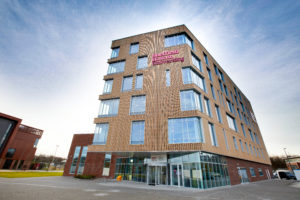Obesity: Government focus on weight misses the bigger picture
Written by: Richard Stubbs and Professor Rob Copeland - 11th September 2020
 In today’s blog which is the final post in our series this week focusing on NHS Reset, our Chief Executive, Richard Stubbs and Professor Rob Copeland, who is the Director of the Advanced Wellbeing Research Centre in Sheffield, argue that we need to invest in creating the right conditions to tackle the social, behavioural, economic and environmental inequalities in our region that have been brought into even sharper focus by the COVID-19 pandemic.
In today’s blog which is the final post in our series this week focusing on NHS Reset, our Chief Executive, Richard Stubbs and Professor Rob Copeland, who is the Director of the Advanced Wellbeing Research Centre in Sheffield, argue that we need to invest in creating the right conditions to tackle the social, behavioural, economic and environmental inequalities in our region that have been brought into even sharper focus by the COVID-19 pandemic.
The TV adverts for the NHS Better Health campaign encouraging people to lose weight and lead healthier lives is a stark reminder of the nationwide challenge we face tackling obesity and the detrimental impact it has on society. The Prime Minister also recently acknowledged obesity as a ‘serious national issue’ which must be addressed, representing a significant U-turn on his views prior to being hospitalised with COVID-19. Whilst investment and prioritisation in promoting a healthy weight is welcome, it is essential we do not approach this through the lens of individual responsibility, stigmatising and blaming people for their apparent ‘lifestyle choices’. It’s much easier to make good choices when you have plenty of options, social support, a re-enforcing environment and resources to do so. Instead, the conversation has to be focused on creating the conditions across our communities that make it easy for everyone to enjoy better health and wellbeing. This means tackling the social, behavioural, economic and environmental inequalities within society that drive the causes of obesity.
Tackling obesity isn’t a new agenda, with more than a decade’s worth of government policies and campaigns, however the COVID-19 pandemic has highlighted the disproportionate impact that disease can have on parts of the population. For example, the least affluent parts of the UK have experienced double the death rate from COVID-19 of affluent ones (55.1 coronavirus-related deaths per 100,000 people, compared to 25.3 per 100,000) and people living in the least affluent areas are more likely to live with long-term conditions and co-morbidities, including obesity and type 2 diabetes. Those from BAME communities, older people, people living in the country’s most deprived areas, those who are obese, and those living with long-term health conditions are all disproportionately affected. The pandemic has shone a light on the prevalence and impact of health inequalities within society, with obesity being one such marker of health inequality.
As we begin to emerge from the pandemic’s first peak and look towards a new future – framed by the potential for further outbreaks – it is vitally important we address the core challenges facing communities and individuals most at risk from the virus. This doesn’t mean highlighting specific health factors which increase an individual’s risk of COVID-19 and encouraging individuals to make better choices but instead, we require a focus on tackling the root causes of inequality so that everyone has the capital (social, educational and economic) to have choices to make. In a recent article with NESTA, Sir Michael Marmot suggested that “if people in the bottom 10 per cent of household income were to follow Public Health England’s healthy eating advice, they would spend 74 per cent of their income on food. Should we blame those people for not eating healthily?” In a recent BMJ blog Prof Harry Rutter outlined that “obesity is an unintended consequence of the ways in which our societies have been set up, the commercial activities that have been prioritised, the vested interests that exert power, and the ways in which these structural drivers have become embedded”. The solutions to these causes cannot therefore lie in the individual choices of those in the most economically disadvantaged parts of our society.
Whilst the impact of the pandemic has been undoubtedly catastrophic across the UK, its impact within the North has been stark: the North West has the highest age-standardised mortality rate for deaths involving COVID-19 outside of London. The recent introduction of local lockdowns within the North are a sign that the virus persists in local circulation.
The recent Marmot 2020 report recognised that since 2010 the North/South health gap divide has increased and time spent in poor health has increased for both men and women in the most deprived areas of the country. The recent ‘Levelling Up Yorkshire and the Humber’ report also acknowledges the challenges faced in the North, reporting that life expectancy in Yorkshire and the Humber is 1 year 10 months lower than the average in England. The report also recognises that health and wealth are intrinsically linked and one cannot be focussed on without the other: poor economic prosperity leads to poor health, whereas interventions designed to improve population health support economic growth and vice versa.
The outlook in the North is not all negative. Yorkshire and the Humber has a rich concentration of health and life sciences assets, many of which focus their efforts on researching and tackling health/economic inequalities, population health and obesity. A great deal of headway has been made in building city-wide societal engagement in population health and fostering cultures of healthy lifestyles. One such initiative is Move More, a product of the National Centre for Sport and Exercise Medicine partnership in Sheffield, that aspires to transform Sheffield into the UK’s most active city, leading to meaningful improvements in health, wellbeing and quality of life across the city.

Sheffield Hallam University’s Advanced Wellbeing Research Centre
The Sheffield Olympic Legacy Park is home to a number of the city’s health and wellbeing assets, focussing on improving the region’s sports facilities, communities, environment and the economy. Sheffield Hallam University’s £14m Advanced Wellbeing Research Centre (AWRC) is one of the park’s centrepieces. The AWRC houses world-class research and design expertise from across Sheffield Hallam University within a state-of-the-art facility. Through research and innovation, the AWRC is dedicated to transforming lives through innovations that help people move and aims to prevent and treat chronic disease by addressing the social, behavioural and economic determinants of health, creating equitable and active communities for all.
The AWRC has recently established RICOVR, a dedicated research and innovation unit to identify interventions which help people recover and rehabilitate from COVID-19. The unit focusses on supporting the growing group of people for whom recovery from the virus is complex and non-linear, requiring on-going support to improve their health, get back to work and to re-engage in activities of daily life.
The system-wide relationships and assets across communities, public, private, academic and health sectors in the Sheffield City Region, creates a compelling ecosystem through which we can begin to tackle health inequality. By collaborating, co-producing and sustaining collective effort towards a vision for enhancing the health and wealth of our communities we can improve the population’s quality of life, better prepare everyone them for any future pandemics and more importantly make a meaningful difference to how happy people in our region say they are.
Nationally and regionally we are at a crossroads, with huge potential to utilise our renewed focus on health and wellbeing as a catalyst to drive widespread improvements in population health and tackle long-standing health inequalities and support economic recovery. To achieve this, we need government investment in our regional eco-systems to make place-based change, engagement at a national level, including organisations such as NHS England to ensure this investment is maintained, and most importantly authentic dialogue and co-production with communities to create the local conditions that reflect what matters most to people.

